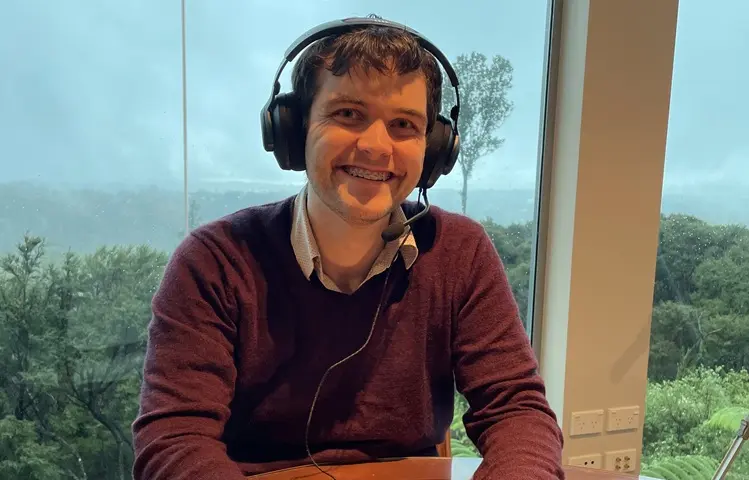Seb's story
Seb from Barnados Aotearoa's 0800 What's Up counselling service has a message of hope for children and teens affected by stroke.

For a young man, Seb feels he’s found his purpose in life and that he wouldn’t trade helping others for any other job in the world. Seb should know. He’s travelled a lot of it.
Born in London and raised in Los Angeles, Seb has lived in New Zealand since he was 15. His dad is a Kiwi and his mum is French.
Seb’s passion for life is obvious. He’s a budding musician, an avid rock climber and his love for dogs runs deep. He says we can learn a lot from man’s best friend.
One of Seb’s greatest passions however is his job. He is a counsellor with 0800 What’s Up and now, as a supervisor, spends a lot of his time caring for those who care for others.
0800 What’s Up provides a free counselling helpline service to tamariki and rangatahi (typically 5-19 years of age). It’s available nationwide, and Kiwis can either call for free or chat online with trained professionals like Seb. Stroke Aotearoa has developed a strong partnership with this trusted service to support children and teens struggling with stroke and, quite often, their loved ones needing support as well.
You don’t need to spend much time with Seb to see he’s in his element. The thing he loves most?
“It’s helping people. If you want to make money or have an easy job, mental health's not the right profession for you. There’s nothing better than showing up to work and knowing that you're making a difference in the life of someone,” he says, “I can go to sleep knowing I did what I wanted to do with my time. I couldn’t go back to retail or working in a factory, but the second someone's life is at stake, ‘I’ve got you.’”
Seb also enjoys the flexibility of his role.
“With adolescents, it's more about identity. They need someone in their corner to find that. And then you get those transitioning into adulthood and maybe they need help figuring out how that's going to work and land in a space where they've got a good trajectory.”
Seb loves the honesty and openness of the younger children he works with.
“I think when you're chatting with older individuals, they might have a more fixed set of beliefs. They've had a lifetime to develop a world view. Children tell you exactly how they're feeling and they don't pull punches. They’ll say, ‘There's this person that's really peeing me off and I don't know how to deal with it.’ An adult may struggle to admit that, but a child just wants a hand figuring out what to do.”
Seb recently supported a young girl whose parent had a stroke.
“What we saw with her, and we see it a lot with young people dealing with illnesses in the family, is a ripple effect. This was someone she really cared about. She was also very worried herself. She didn't know if she’d be OK and if she would be provided with all of the things she was relying on her parent for. There was a huge level of stress and uncertainty in her life. Our role was really plugging in and talking her through it. ‘What does it look like at home now? Who knows that you feel that way? How can we help you cope?’ Those were the questions we were able to ask so she didn’t feel like the ground was falling beneath her. Even though things were changing, there was still a path forward. It was really cool to see she started to have longer-term goals and her emotions started to feel more manageable. So she shifted away from being reactive to proactive with her life and using her emotions as a way to move forward.”
Seb is frequently in touch with children and teens struggling with illnesses of their own.
“I think physical health is tough because you’re at an age where you expect to be invulnerable and keeping pace with your peers. If you've got a physical challenge that's holding you back, it can be a really isolating experience. Despite this we ask, ‘How can we find the way forward that makes you feel happy and proud and content with the person that you are turning into?’ It isn't exclusive to people with those challenges either. Every child or teen has people in their lives who have a bias about who they want that person to become. As far as we're concerned, the only person's voice that really matters is the child’s or teen’s. What's their identity? Who do they want to be?”
Seb has some advice for young people grappling with stroke.
“No matter how you feel, I really want you to know that you have not lost the life that you want to have,” he says, “There are going to be challenges, but you are not alone going through those challenges. And there are people in your community who want to support you to be who you want to be. It's not the end, it's just a bump on the road.”
If you know a child or teen struggling with stroke or the stroke of a loved one, please ask them to reach out to 0800 Whats Up (0800 942 8787) or chat online at whatsup.co.nz. People like Seb are here to help.